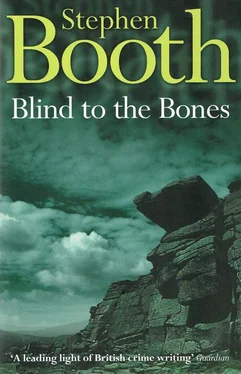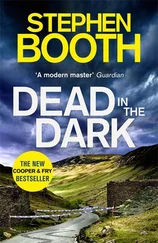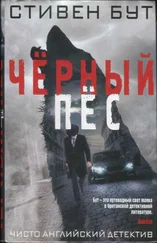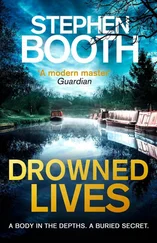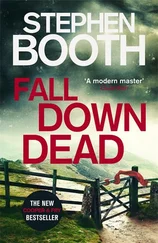‘Mr and Mrs Renshaw,’ said Fry, ‘I know you’ve gone over all this many times before, but I have to ask what Emma’s exact relationship was with Alex Dearden and Neil Granger.’
‘The only relationship Emma had with Neil Granger was that he was a fellow sufferer,’ said Howard.
‘Sufferer?’
‘Migraines. Granger has them, too. Apparently, his are so severe that he can black out completely.’
‘I see. And Alex Dearden?’
‘We had hopes of Alex. But he has another girlfriend now.’
‘Oh? Someone he met at university, or since he came back?’
‘I wouldn’t know.’
But Fry remembered Alex Dearden complaining that Mrs Renshaw rang him every week. What was she really trying to find out from him? Did she really think he might hear from Emma? Wouldn’t she ask him about his new girlfriend? Or was that another thing she didn’t want to face — another indication that life had moved on and left Emma behind?
‘I understand you’ve had counselling,’ said Fry.
Sarah laughed. ‘Oh, yes. We learned phrases like “Letting go”, “Moving on”, and “Closure”. But all the time I kept asking myself: “How could I have allowed it to happen?”’
‘We’ve talked about it a lot,’ said Howard. ‘We thought it was important to talk. We decided it isn’t about letting go, but about getting a new perspective on your life. It’s more like turning over a piece of earth. Everything on the surface disappears, and new things appear in their place. But it’s still the same piece of earth, isn’t it? It’s still the same life.’
Fry had been told different. She had been advised that sometimes people felt the need to clutch their suffering to them, fearing that if they ‘let it go’, they would themselves vanish. Their suffering began to define them.
But Sarah Renshaw was right — commemoration was important. A person you had lost could touch you sometimes, in unexpected ways. You might glance into a room and see her sitting on her bed, or catch a fleeting trace of her familiar scent passing along the corridor. You could hear her voice in the silence at night, or her footsteps crossing the floor above your head as you watched television in the evening. Commemoration was an important thing. It was like reaching out to let her know you were there for her. Commemoration was like returning the touch.
On their way back through Withens from the Renshaws’ house, Diane Fry and Gavin Murfin noticed the police Vauxhall immediately.
‘Anyone we know?’ said Murfin.
‘I doubt it.’
‘I’m not so sure. Who’s that coming across the road?’
Fry stared. ‘What the hell’s Ben Cooper doing here?’
‘Not sightseeing, that’s for certain,’ said Murfin. ‘This place looks like something the cat ate and sicked up again.’
‘Pull up in front of the pub, Gavin.’
‘Ah. Now you’re talking.’
Fry wound down the window of the car as Cooper came across.
‘Well, well. I thought we’d lost you,’ she said.
‘It’s wonderful how people worry about me.’
‘No such luck, though, eh?’
‘No such luck. This is Tracy Udall, by the way, from the Rural Crime Team.’
Fry looked her up and down. Confident, capable-looking. Pretty much as she had been herself once, before she joined CID.
‘Hello.’
Gavin Murfin gave a cheerful wave from behind the steering wheel.
‘Hi,’ said Udall. ‘Withens hasn’t seen so much police activity for years. Folks round here will be getting paranoid.’
‘Some already are,’ said Fry.
‘Where have you been?’ asked Cooper.
‘To see the Renshaws.’
‘Ah,’ said Udall. ‘I see what you mean. Though paranoid isn’t quite the right word.’
‘Emma Renshaw’s parents,’ said Cooper. ‘I’d forgotten they lived in Withens. What’s happening with that? Have I missed anything?’
‘Well, that’s what happens when you get promoted to the Rural Crime Team.’
‘Has Emma been found? It can’t be a murder enquiry, I would have heard. Wouldn’t I, Diane?’
‘Well, I expect so.’ Then Fry took pity on him. ‘Of course you would have heard, Ben. I’d have been kicking up all kinds of stink to get you back, no matter what the Rural Crime Team said.’
She didn’t look at PC Udall, but Udall seemed to get the message.
‘Tell you what, I’ll see you back at the car, Ben,’ she said. ‘I’ve got some calls to make.’
Fry watched her walk away, giving a hitch to her duty belt. Full of confidence, totally unfazed.
‘She’s a good officer,’ said Cooper.
‘I’m sure.’
Fry saw the stubborn set of his face and suppressed an urge to wind him up some more. She had promised herself she was going to be nice to him. Besides, loyalty was one of his strong points, as she well knew.
‘So it isn’t a murder enquiry?’
‘Not until we get the bloodstains analysed,’ said Fry. ‘And then we’ll let you know.’
‘Where are you heading now?’
‘Tintwistle. To see if we can track down one of Emma Renshaw’s housemates. A young man by the name of Neil Granger, who we can’t seem to catch at home.’
Cooper put his hand on the car to stop them driving away.
‘Don’t be in too much of a rush,’ he said. ‘Somebody’s already found him for you.’
DI Paul Hitchens was in the incident room at Edendale, where a team was being set up for the enquiry into Neil Granger’s death. No decision had yet been taken to activate the HOLMES procedures. If an obvious suspect presented himself during the initial enquiries, there wouldn’t be any need for the drain on staff and resources that was involved in a major enquiry. If E Division had too many major enquiries, it would miss its annual targets for house burglary and street crime.
Diane Fry thought Hitchens seemed a bit distracted these days. Maybe the new DCI was giving him a hard time. There were changes in the air around E Division, but then things didn’t stay the same in the police service very long. Hitchens might be feeling the draught a bit.
‘Well, if there’s a link with the Emma Renshaw case, I’m sure we’ll find it, Diane,’ he said.
‘Neil Granger was next on my list for interview,’ said Fry.
‘I’m aware of that. But who could possibly have known that there was a new line of enquiry in the Renshaw case?’
‘Her parents. And I’ve already spoken to Alex Dearden as well, sir.’
‘But Diane, Neil Granger has been dead since Friday night or the early hours of Saturday morning — before you talked to the Renshaws or Dearden.’
‘Still...’
‘I know it’s frustrating that you’ve lost a witness. But come to the briefing in the morning, and you’ll see that there are some important developments in other directions.’
‘I see. The link to Emma Renshaw is a low priority in the DCI’s thinking?’
‘Yes, but you’ll see why in the morning, Diane.’
‘I’d like to make one request then, sir.’
‘What’s that?’
‘I’d like to attend the Neil Granger postmortem.’
Hitchens paused. ‘Well, I don’t see why not. Mrs Van Doon never objects to an audience. I’ll clear it with Mr Kessen.’
‘Thank you, sir.’
‘This theory isn’t actually set in stone, Diane,’ said Hitchens smugly. ‘But it involves something equally solid.’
Fry waited for him to explain, but instead he smiled and changed tack.
‘You don’t remember the original Renshaw case yourself?’ he said.
‘No, sir. Why should I?’
‘West Midlands — that’s where you served before you came to Derbyshire, wasn’t it?’
Fry watched him carefully, wondering what he was leading up to.
‘It’s a pretty big area, sir. I mean, we’re talking cities here, large populations, high-volume crime. Lots and lots of missing young people. Besides, I worked in Birmingham, not the Black Country, though that’s where I lived.’
Читать дальше
Конец ознакомительного отрывка
Купить книгу
